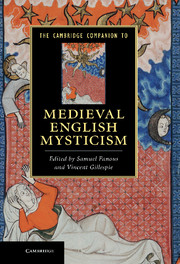Book contents
- Frontmatter
- Contents
- List of contributors
- Preface
- Chronology
- List of abbreviations
- 1 Introduction
- 2 c. 1080–1215: culture and history
- 3 c. 1080–1215: texts
- 4 1215–1349: culture and history
- 5 1215–1349: texts
- 6 1349–1412: culture and history
- 7 1349–1412: texts
- 8 1412–1534: culture and history
- 9 1412–1534: texts
- 10 1534–1550s: culture and history
- 11 1534–1550s: texts
- Guide to further reading
- Glossary of theological terms
- Index
Preface
Published online by Cambridge University Press: 28 July 2011
- Frontmatter
- Contents
- List of contributors
- Preface
- Chronology
- List of abbreviations
- 1 Introduction
- 2 c. 1080–1215: culture and history
- 3 c. 1080–1215: texts
- 4 1215–1349: culture and history
- 5 1215–1349: texts
- 6 1349–1412: culture and history
- 7 1349–1412: texts
- 8 1412–1534: culture and history
- 9 1412–1534: texts
- 10 1534–1550s: culture and history
- 11 1534–1550s: texts
- Guide to further reading
- Glossary of theological terms
- Index
Summary
Mysticism is innately mysterious. As an experience, it claims to have encountered mystery. As a theology, it attempts to analyse that mysterious encounter. As a text, it struggles to articulate mysterious experiences that resist and elude understanding and expression. A Middle English version of Jan van Ruusbroec asserts that mysticism in all its dimensions is always poised on the brink of paradox:
It maye not be lefte ne Ʒit takyn; to wante it is intolerable, to folowe it impossible. It may not be schewed open ne Ʒit hid in silence. It excedys alle resoun and witt, and it is abofe alle creatures, and þerfore it may on no wyse be touched. Neuerþelesse, beholdynge ourselfe we feele the spirit of God dryfe vs and put vs into þat inpacient taryngne; bot beholdynge above ourselfe we persayve the spirit of God of oureselfe drawynge vs, and turning vs to nouƷt in hymselfe.
Mystical texts seek to understand or impressionistically describe moments of intense experience (or the transcendence of experience), and do so using an extraordinary array of rhetorical, poetic, and linguistic strategies and subversions. In modern times, the Welsh poet R. S. Thomas has perhaps most memorably expressed the delicate indirections and paradoxical imprecisions fundamental to the symbiosis between the restless yearning of contemplation and the ineffability of mystical experience:
Godhead
is the colonisation by mind
of untenanted space. It is its own
light, a statement beyond language
of conceptual truth. […]
Resting in the intervals
of my breathing, I pick up the signals
relayed to me from a periphery I comprehend.
- Type
- Chapter
- Information
- The Cambridge Companion to Medieval English Mysticism , pp. ix - xivPublisher: Cambridge University PressPrint publication year: 2011

